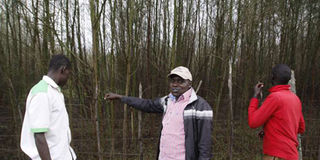More men growing trees than women, says study

A Wattle tree plantation. A study found out that gender, age, and level of education are the main factors that influence an individual’s decision to venture into commercial forestry or not. PHOTO | JARED NYATAYA | NATION MEDIA GROUP
What you need to know:
- Besides gender, the scientists also found that age was an important factor in determining whether an individual will invest in commercial tree growing or not.
- The level of education is also likely to determine whether an individual invests in commercial tree growing or not.
- 99 per cent of the small-scale farmers had not borrowed money for farming, including investing in commercial tree growing, with 93 per cent of farmers using their personal savings.
A team of researchers have found out that gender, age, and level of education are the main factors that influence an individual’s decision to venture into commercial forestry or not.
In a study recently published in the International Journal of Research in Business Studies and Management, scientists found that not as many women as men were venturing into commercial tree growing due to social biases, economic exclusion and lack of equality.
Women constitute less than a third of commercial tree growers in Kenya.
The researchers, led by Dr Benson Kanyi, Director, Tree Biotechnology Programme Trust, sought to determine factors that influence a farmer’s decision to invest in improved eucalyptus tree varieties for commercial purposes.
Besides gender, the scientists also found that age was an important factor in determining whether an individual will invest in commercial tree growing or not.
According to the study, people above 36 years were more likely to invest in commercial tree growing.
In Lari, Kiambu County for instance, 85 per cent of the farmers who had invested in planting improved eucalyptus varieties for commercial purposes were above 36 years, 13 per cent were aged 26-35 years and only 2 per cent below 25 years.
PERSONAL SAVINGS
The level of education is also likely to determine whether an individual invests in commercial tree growing or not. While entrepreneurship requires general knowledge, formal education normally increases the knowledge.
In the study, 47 per cent of the commercial tree growers had attained secondary education level, 34 per cent had primary level of education, 16 per cent tertiary level, 2 percent were university graduates and only 1 per cent had not gone to school.
Kanyi explains why very few graduates venture into commercial tree growing. “University graduates have more chances to become wage earners and/or entrepreneurs and more so, if they are women.
The more the women become educated, the more they likely to become wage earners.”
Interestingly, access to financial services was not a factor in influencing a farmer’s decision to invest in commercial tree growing.
The researchers found that 99 per cent of the small-scale farmers had not borrowed money for farming, including investing in commercial tree growing, with 93 per cent of farmers using their personal savings.




